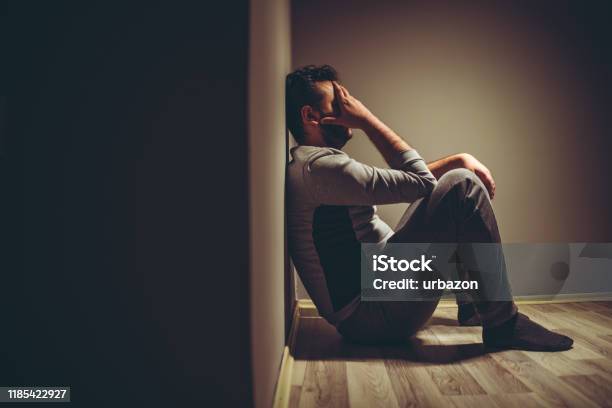
You can wear the smile. Shake the hands. Hit the gym. Cash the paycheck.
But deep down, there’s a voice that won’t shut up: You’re not enough.
It doesn’t scream. It whispers. In the silence before you sleep. In the pause between her words. In the mirror you avoid looking at for too long.
You bury it under jokes. You hide it behind bravado. You overcompensate with hustle, hoping no one notices the fatigue in your eyes. But you notice. And that’s enough to break you.
I know because I’ve been there. I once walked into rooms already losing a fight no one else could see. Comparing myself to ghosts. Measuring myself against standards no one set but me. Exhaustion wore a suit and tie, and I called it “confidence.”
If you’ve ever felt that silent weight pressing on your chest, this post is for you.
We’re going to rip open the silence. We’re going to talk about the thing men aren’t supposed to talk about. And by the end, you’ll see the truth: the power to feel worthy was never out there. It was always in you.
1. The Ghost You Compete With Isn’t Real — But It’s Beating You Anyway
The cruelest rival you’ll ever face is the one who doesn’t exist.
I used to walk into rooms already losing. Not to the people in front of me. But to the ones in my head. Imaginary men I decided were better, stronger, more desirable.
It didn’t matter if they were real or not. My brain played highlight reels of their victories while fast-forwarding through my failures.
That’s the trick insecurity plays: it doesn’t need evidence. It only needs doubt.
And once doubt takes root, it becomes fertilizer for shame. You stop showing up as yourself. You start performing for a crowd that isn’t even there.
The tragedy? The only person clapping is the ghost you invented.
2. You Were Shamed Before You Even Knew What Pride Felt Like
Shame doesn’t begin in adulthood. It’s hardwired when you’re still a kid.
I remember being twelve, standing in a locker room, laughing at jokes I didn’t understand—while quietly hoping they weren’t about me. Those moments etch something into you.
Before you even know what pride feels like, you learn what “not enough” means.
That script doesn’t just fade. It grows up with you. Suddenly, the voice inside your head isn’t twelve anymore. It’s thirty. It’s forty. It’s wearing your face, repeating the same lines: You’ll never measure up.
What’s counterintuitive? That early shame often becomes the foundation of ambition. You hustle harder. You push yourself ruthlessly. Not to win—but to outrun a memory.
But you can’t outrun the past. You can only rewrite the story. Naming where the shame started is the first step toward cutting it loose.
3. “You’re Normal” Is the Worst Compliment You’ll Ever Get
No one grows up dreaming of being average.
Yet we’re told that being “normal” should feel like safety. That fitting in is a win. That blending in means you belong.
But here’s the quiet sting: being called “normal” doesn’t soothe the insecurity. It magnifies it.
Normal doesn’t feel safe. It feels invisible. Forgettable. Replaceable.
I once had someone tell me, “You’re perfectly fine.” They meant it kindly. But what I heard was: You’ll never be unforgettable.
And that hurt more than criticism ever could.
Men don’t crave being “fine.” They crave being remembered. Not as statistics. Not as placeholders. But as stories worth retelling.
Here’s the paradox: you don’t become significant by chasing significance. You become significant by living your truth loudly enough that others feel less alone.
Average dies when authenticity walks in.
4. The Confidence Act Is Draining the Life Out of You
Confidence is the most expensive mask you’ll ever wear.
I wore mine for years. It looked sharp from the outside—firm handshake, steady voice, a little humor at the right time. But underneath? I was exhausted.
Confidence isn’t supposed to feel like a full-time job. If it does, you’re faking it.
Pretending to be “fine” drains you because it turns every moment into theater. You’re scanning reactions. Reading faces. Editing yourself in real time.
By the end of the day, you’re not tired from living. You’re tired from acting.
The brutal irony? People rarely believe the performance as much as you think. They feel the cracks. They sense the strain.
Real freedom comes not from doubling down on the mask, but from finally putting it down. The people who matter don’t need you polished—they need you present.
5. Even Winning Doesn’t End the War in Your Head
You think the next achievement will silence the voice.
The promotion. The new car. The better apartment. The woman who says yes.
And for a moment—it works. There’s a high, a rush, a flicker of relief. But the voice doesn’t die. It just shapeshifts.
Instead of “You’re not enough,” it whispers, “You won’t keep this. Someone else deserves it more. What if they find out you’re a fraud?”
I’ve felt that after milestones I once thought would fix me. I’d stand on a stage, applause in the room, and still hear the voice in my chest: You don’t belong here.
Success without self-acceptance isn’t peace. It’s paranoia.
The counterintuitive truth? The war doesn’t end by stacking wins. It ends when you stop letting wins define you in the first place.
6. What You Don’t Say Becomes a Weapon Against You
Silence feels safe. But it’s a loaded gun pointed at your chest.
Men are trained not to speak the hard truths. Don’t admit fear. Don’t confess doubt. Don’t say the words that sound like weakness.
So we swallow them. And the swallowed words rot. They turn into sarcasm. Anger. Emotional distance.
I once went months without saying how overwhelmed I felt. I told myself I was protecting others from my heaviness. In reality, I was detonating relationships from the inside. My silence was the bomb.
Here’s the paradox: saying “I don’t feel enough” doesn’t break connection. It deepens it. Vulnerability is the pressure valve. Without it, the system explodes.
Silence is not strength. Silence is self-destruction.
7. The Last Taboo Is Men’s Self-Worth
We live in a world where women are starting movements, sharing struggles, building support systems. And rightly so.
But men? Men get silence. No campaigns. No slogans. No safe circles. Just the unspoken rule: don’t talk about it.
That silence is the secret killer.
Because what we can’t name, we can’t heal. What we hide in the dark grows teeth.
The last taboo isn’t s*x. It isn’t money. It isn’t politics. It’s men whispering the words: I don’t feel enough.
And until more of us say it out loud, millions will keep breaking quietly, behind closed doors, with no one noticing until it’s too late.
8. The Size That Matters Has Nothing to Do With Numbers
Here’s the mic-drop: the size that matters isn’t physical. It’s the size of your presence.
Numbers don’t define you. What defines you is the courage to stand bare—flawed, imperfect, fully seen—and still believe you’re worthy of love, respect, and belonging.
Think about the moments you remember others for. It’s rarely about their stats, their titles, or their measurements. It’s about how they made you feel.
I once had a friend who commanded every room he walked into. Not because he was tall, or loud, or impressive on paper. But because he looked people in the eye, listened deeply, and made everyone feel like they mattered.
That’s significance. That’s impact. That’s the size that matters.
And the freedom you crave? It begins the second you stop obsessing over what can’t be controlled, and start doubling down on what always could.
When the Mirror Finally Speaks Back
You’ve carried that secret for so long it feels welded to your bones.
That whisper: “I’m not enough. I never was.”
It hides behind your banter, your hard work, your silence.
And I know what you’re thinking.
“If I let go of the mask, if I say it out loud, won’t it prove everyone right? That I’m weak, broken, less?”
No. It proves the opposite. It proves you’re human.
Here’s the truth most men will never hear: the exhaustion isn’t from your job, your relationships, or your failures. It’s from the act. The endless performance of being “fine.” The standing ovation you’ve been chasing already exists — inside you.
Think about what we uncovered here:
- You don’t have to fight ghosts.
- You don’t have to carry childhood shame into your thirties, forties, fifties.
- You don’t have to call yourself “normal” like it’s a prison sentence.
- You don’t have to keep pretending while your insides scream for air.
That’s the gift: self-worth doesn’t come from medals, numbers, or masks. It comes from the courage to be seen raw, unpolished, unperformed.
And maybe you don’t believe that yet. Maybe you’re still scrolling, still skeptical, still tired.
Good. That means you’re awake.
The bravest men I’ve met aren’t the loudest. They’re the ones who whispered, “I can’t keep faking it,” and then chose to show up anyway.
So here’s my invitation. Not a lecture. Not a slogan. Just this:
Stop rehearsing. Step into the room as you are. Watch the silence shatter.
Because the secret that’s been killing you? It dies the moment you speak.
John Emmanuel is a results-obsessed relationship blogger and founder of Top Love Hacks, dedicated to helping you level up your dating and relationship game by motivating you to be in control of your love life.



